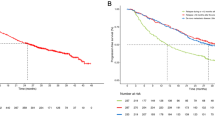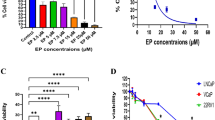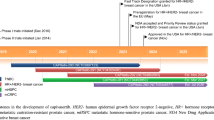Abstract
Purpose
2-Methoxyestradiol (2ME), an endogenous estradiol metabolite, was developed as a novel agent based on its antitumor activity and lack of toxicity. This study was designed to investigate the modulatory effect of 2ME on the antitumor effect of doxorubicin (Dox) in resistant breast tumor xenograft. Resistant MCF-7/Dox cells were implanted subcutaneously in nude mice
Methods
Treatment with Dox 5 mg/kg, 2ME 30 mg/kg and their combination continued twice a week for 2 weeks.
Results
Following 28 days from starting the treatment with Dox alone, the change in tumor volume from first day of treatment was 455.6 ± 16.2%. Combined Dox and 2ME treatment significantly reduced tumor volume to 20.8 ± 43%. Also, combined therapy resulted in enhanced tumor apoptotic and reduced proliferative activities relative to Dox alone. The apoptotic indices were 0.13 ± 0.03 and 0.75 ± 0.06 in Dox alone and Dox + 2ME groups, respectively. For Dox alone group, expression of the proliferative markers PCNA and Ki67 were 0.78 ± 0.06 and 0.63 ± 0.18, respectively. They were significantly reduced to 0.28 ± 0.1 and 0.12 ± 0.1 for their corresponding combined Dox and 2ME group. Interaction analysis clearly indicated that 2ME synergies antitumor, apoptotic and anti-proliferative activity of Dox. Examining body weight, hepatic and cardiac histopathology of the different treatment groups revealed no significant signs of toxicity.
Conclusion
These findings suggest that 2ME reverses Dox resistance, with benign side effects profile.





Similar content being viewed by others
References
Chaudhary P, Roninson I (1993) Induction of multi-drug resistance in human cells by transient exposure to different chemotherapeutic drugs. J Natl Cancer Inst 85:632–639
Chauhan D, Catley L, Hideshima T, Li G, Leblanc R, Gupta D, Sattler M, Richardson P, Schlossman R, Podar K, Weller E, Munshi N, Anderson K (2002) 2-Methoxyestradiol overcomes drug resistance in multiple myeloma cells. Blood 100(6):2187–2194
Chen J, Konopleva M, Andreeff M, Multani A, Pathak S, Mehta K (2004) Drug-resistant breast carcinoma (MCF-7) cells are paradoxically sensitive to apoptosis. J Cell Physiol 200(2):223–234
D’Amato R, Lin C, Flynn E, Folkman J, Hamel E (1994) 2-Methoxyestradiol, an endogenous mammalian metabolite, inhibits tubulin polymerization by interacting at the colchicines site. Proc Natl Acad Sci USA 91:3964–3968
Dingli D, Timm M, Russell S, Witzing T, Rajkumar S (2002) Promising preclinical activity of 2-methoxyestradiol in multiple myeloma. Clin Cancer Res 8:3948–3954
Dobos J, Tímár J, Bocsi J, Burián Z, Nagy K, Barna G, Peták I, Ladányi A (2004) In vitro and in vivo antitumor effect of 2-methoxyestradiol on human melanoma. Int J Cancer 112(5):771–776
Fostis T, Zhang Y, Pepper M, Adlercreutz H, Montesano R, Nawroth P, Schweigerer L (1994) The endogenous oestrogen metabolite 2-methoxyestradiol inhibits angiogenesis and suppresses tumour growth. Nature 368:237–239
Han G, Liu Z, Shimoi K, Zhu B (2005) Synergism between the anticancer actions of 2-methoxyestradiol and microtubule-disrupting agents in human breast cancer. Cancer Res 65(2):387–393
Herzog C, Tsokos M, Bates S, Fojo A (1993) Increased mdr-1/P-glycoprotein expression after treatment of human colon carcinoma cells with P-glycoprotein antagonists. J Biol Chem 268:2946–2952
Ireson C, Chander S, Purohit A, Perera S, Newman S, Parish D, Leese M, Smith A, Potter B Reed M (2004) Pharmacokinetics and efficacy of 2-methoxyestradiol and 2-methoxoestradiol-bis-sulphamate in vivo in rodents. Br J Cancer 90:932–937
Ishida H, Okabe M, Gomi K, Horiuchi R, Mikami K, Naito M, Tsuruo T (1994) Modulation of adriamycin resistance in human breast carcinoma MCF-7 cells in vitro and in vivo by medroxyprogesterone acetate. Jpn J Cancer Res 85:542–549
Kerb R, Hoffmeyer S, Brinkmann U (2001) ABC drug transporters: hereditary polymorphism and pharmacological impact in MDR1, MRP1 and MRP2. Pharmacogenomics 2:51–64
Klauber N, Parangi S, Flynn E, Hamel E, D’Amato R (1997) Inhibition of angiogenesis and breast cancer in mice by the microtubule inhibitors 2-methoxyestradiol and taxol. Cancer Res 57:81–86
Leonard R, Rodger A, Dixon J (1994) Metastatic breast cancer. Br Med J 309:1501–1504
Li L, Da J, Landstrom M, Ulmsten U, Fu X (2005) Antiproliferative activity and toxicity of 2-methoxyestradiol in cervical cancer xenograft mice. Int J Gynecol Cancer 15:301–307
Ling V (1997) Multidrug resistance: molecular mechanisms and clinical relevance. Cancer Chemother Pharmacol 40(suppl):S3–S10
MacCarthy-Morrogh L, Townsend P, Purohit A, Hejaz H, Potter B, Reed M, Packham G (2000) Differentical effects of estrone and estrone-3-O-sulphamate derivatives on mitotic arrest, apoptosis and microtubule assembly in human breast cancer cells. Cancer Res 60:5441–5550
McCormick D, Johnson W, Pribluda V, Green S, Tomaszewski J, Smith A (2000) Preclinical development of 2-methoxyestradiol (2ME2, NSC-659853). [Abstract]. Proc Am Assoc Cancer Res 41:328
Mimnaugh E, Faichild C, Fruehauf J, Sinha B (1991) Biochemical and pharmacological characterization of MCF-7 drug sensitive and Adr multidrug-resistant human breast tumor xenografts in athymic nude mice. Biochem Pharmacol 42:2, 391–402
Mehta K (1994) High levels of transglutaminase expression in doxorubicin resistant human breast carcinoma cells. Int J Cancer 58:400–406
Merriam G, MacLusky N, Picard M, Naftolin F (1980) Comparative properties of the catechol estrogens, I: methylation by catechol-O-methyl-transferase and binding to cytosol estrogen receptors. Steroids 36:1–11
Mooberry S (2003) New insights into 2-methoxyestradio, a promising antiangiogenic and antitumor agent. Curr Opin Oncol 15:425–430
Mueck A, Seeger H, Huober J (2004) Chemotherapy of breast cancer-additive anticancerogenic effects by 2-methoxyestradiol? Life Sci 75(10):1205–1210
O’Connor R (2007) The pharmacology of cancer resistance. Anticancer Res 27(3A):1267–1272
Pribluda V, LaVallee T, Green S (2002) 2-Methoxyestradiol: a novel endogenous chemotherapeutic and anti-angiogenic agent. In: Fan T-PD, Kohn E (eds) The new angiotherapy. Humana Press, Totawa, pp 387–408
Ryschich E, Werner J, Gebhard M, Klar E, Schmidt J (2003) Angiogenesis inhibition with TNP-470, 2-methoxyestradil, and paclitaxel in experimental pancreatic carcinoma. Pancreas 26:166–172
Sutherland T, Schuliga M, Harris T, Eckhardt B, Anderson R, Quan L, Stewart A (2005) 2-Methoxyestradiol is an estrogen receptor agonist that supports tumor growth in murine xenograft models of breast cancer. Clinical Cancer Res 11:1722–1732
Tinley T, Leal R, Randall-Hlubek D, Cessac J, Wilkens L, Rao P, Mooberry S (2003) Novel 2-methoxyestradiol analogues with antitumor activity. Cancer Res 63:1538–1549
Ulmann C, Eliot H, Sinha B (1991) Distibution, DNA damage and cytotoxic effects of etoposide in human tumor xenografts in vivo. Anticancer Res 11:1379–1382
Vijayanathan V, Venkiteswaran S, Nair S, Verma A, Thomas T, Zhu B, Thomas T (2006) Physiologic levels of 2-methoxyestradiol interfere with nongenomic signaling of 17beta-estradiol in human breast cancer cells. Clin Cancer Res 12(7 Pt 1):2038–2048
Wang L, Yang C, Horwitz S, Trail P, Casazza A (1994) Reversal of the human and murine multidrug-resistance phenotype with megestrol acetate. Cancer Chemother Pharmacol 34:96–102
Wild R, Ramakrishnan S, Sedgewick J, Griffioen A (2000) Quantitative assessment of angiogenesis and tumor vessel architecture by computer-assisted digital image analysis: effects of VEGF–toxin conjugate on tumor microvessel density. Microvasc Res 59:368–376
Von Hoff D, Rozencweig M, Piccat M (1982) The cardiotoxicity of anticancer agents. Semin Oncol 9:23–33
Yi X, Bekeredjian R, DeFilippis N, Siddiquee Z, Fernandez E, Shohet R (2006) Transcriptional analysis of doxorubicin-induced cardiotoxicity. Am J Physiol Heart Circ Physiol 290(3):H1098–102
Acknowledgments
This work was funded mainly by the Egyptian interior mission department, Ministry of Higher Education, Egypt.
Author information
Authors and Affiliations
Corresponding author
Rights and permissions
About this article
Cite this article
Azab, S.S., Salama, S.A., Hassan, M.H. et al. 2-Methoxyestradiol reverses doxorubicin resistance in human breast tumor xenograft. Cancer Chemother Pharmacol 62, 893–902 (2008). https://doi.org/10.1007/s00280-008-0679-9
Received:
Accepted:
Published:
Issue Date:
DOI: https://doi.org/10.1007/s00280-008-0679-9




